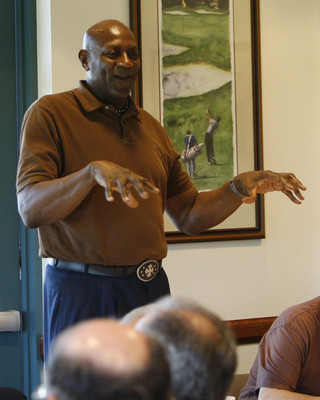Trailblazing Haywood tells of journey to ‘hell’ and back

There was a time the past few decades when you might have thought of him as Waldo, the character in a children’s book series hidden among hundreds of tiny people doing various things. But he was rarely lost. Not like before anyway. Not like the two years he spent in hell.
The hands. They always set Spencer Haywood apart. Hands of Goliath. Hands that palmed a basketball as if it were a quarter. Hands of gold in 1968. There he is, standing in front of a breakfast gathering on Sunday before a men’s club from the Temple Beth Knesset Bamidbar, telling a story of the man who changed the face of professional basketball and remains today one of its most underappreciated stars.
Spencer Haywood. There he is.
What an incredible journey.
“I am standing outside the bathroom at a movie theater three months ago, and this giant was doing the same thing, so I walked up and said, ‘Do you want to shoot baskets for money?’ ” said Murray Waks, president of the men’s club. “He looked down and said, ‘Sonny, where, when and for how much?’
“Before we left each other, I asked if he would come speak to our club.”
Waks heard the man’s name and instantly knew because he was a Knicks fan way back when and New York was one of six teams Haywood played for from 1969 to 1983. But those who know the story know Haywood’s impact was not made on any singular game or playoff series or even season.
If you think the sham that is often Hall of Fame inclusion wrongly has excluded Jerry Tarkanian (it has), check out Haywood’s resume and influence on the game. The fact he wasn’t named to the NBA’s all-time 50 greatest players list is laughable.
He not only averaged 20.3 points and 10.3 rebounds in his career but poured the concrete that has for years now allowed stars such as Kobe Bryant and LeBron James and Kevin Garnett to jump from high school directly to the NBA. Haywood was the first to challenge the league for early entry, and the Supreme Court in 1970 sided with him and the Seattle SuperSonics.
His reasoning was financial hardship, the kind born from being one of 10 children growing up picking hundreds of pounds of cotton a day for $2 in the town of Silver City, Miss., so small that a 2000 census counted a population of 337 and an area of 0.6 square miles.
You want a voyage?
Try playing a season at Trinidad State Junior College in Colorado one year, winning a gold medal at the 1968 Olympics while shooting 71.9 percent the next. Playing for the University of Detroit as a sophomore, being named Rookie of the Year in the American Basketball Association while averaging 30 points and 19.5 rebounds, jumping to the NBA by setting a historic precedent. Signing a record $1.9 million contract, starting a jazz studio, living a life of fashion models holding one hand and the keys to a Rolls Royce resting in the other. Battling a cocaine addiction near the end of his career, passing out at a Lakers practice during the 1980 NBA Finals, being released and not awarded his championship ring for six years.
The same ring he wore Sunday at Durango Hills Golf Club.
“I have sunk to the bottom and know what hell is like,” said Haywood, now 60 and living in Las Vegas for the past three years while also commuting to a home in Michigan. “I’m looking forward to heaven. I speak about my troubles in hopes it will help another. Especially now. So many people need encouragement — lost homes, lost jobs, lost cars, lost everything — and it’s easy to turn to something besides your faith.
“But if you can wade through all the crap, all the muck and slime, you will come out better. You will get there.
“Things like the (Hall of Fame and top 50 players list) … I’d love to be included, but I have a rule in my life I follow very carefully. Things happen on God’s time, not on mine.”
His first basketball was made out of a sack and paper and didn’t bounce. His first rim was crafted from a barrel. He was 5 when he swore those hands would one day make him the greatest cotton picker in the history of Mississippi. He was 12 when he didn’t like picking cotton much any more. His toys as a child came from digging in a junkyard, the same one he returned to after his battle with drugs to sit and think and remember what real struggle means.
Talk about a fascinating life.
There he is. Spencer Haywood.
Hands and all.
Las Vegas Review-Journal sports columnist Ed Graney can be reached at 383-4618 or egraney@reviewjournal.com